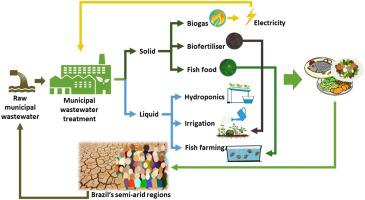Journal of Water Process Engineering ( IF 6.3 ) Pub Date : 2020-06-27 , DOI: 10.1016/j.jwpe.2020.101483 Bianca Barros Marangon , Thiago Abrantes Silva , Maria Lúcia Calijuri , Sabrina do Carmo Alves , Vitor Juste dos Santos , Adriana Paulo de Sousa Oliveira

|
Water scarcity and the precariousness of municipal wastewater treatment, associated with high social vulnerability and resource shortages in Brazil’s semi-arid regions, aggravate social disparities and make it impossible to improve the quality of life for the population living there. It is possible to reverse this scenario through the reuse of treated municipal wastewater in productive activities. This paper sets up a scenario with hydroponic cultivation, crop irrigation and fish farming using treated municipal wastewater as a mean of recovering water and nutrients, for food and income generation for the local families. Multicriteria decision analysis was applied to select a treatment system that would allow municipal wastewater reuse. A conventional preliminary treatment was used and, for the biological treatment, a Upflow anaerobic sludge blanket digestion (UASB) reactor was selected, which transforms the organic fraction of wastewater into biogas and sludge. When converted into electricity, biogas allows the meeting of the wastewater treatment plant demand and sludge could be applied to the soil as biofertiliser. Two post-treatments are presented: high-rate pond and constructed wetland. Both post-treatments are adequate and provide treated municipal wastewater in a satisfactory condition for reuse. In addition, they produce biomass, which can be used as fish food. Water and nutrients are kept in a cycle, bringing socioeconomic benefits to the population and environmental benefits to the semi-arid regions.
中文翻译:

在巴西半干旱地区的生产活动中重复使用经过处理的市政废水
缺水和市政废水处理的不稳定,与巴西半干旱地区的高度社会脆弱性和资源短缺相关,加剧了社会差距,无法改善那里居民的生活质量。通过在生产活动中重复使用经过处理的市政废水,可以扭转这种情况。本文提出了一种方案,将水处理耕作,农作物灌溉和养鱼业用经过处理的市政废水作为水和养分的回收手段,为当地家庭提供食物和创收。应用多标准决策分析来选择可允许市政废水再利用的处理系统。使用常规的初步处理,对于生物学处理,选择了上流厌氧污泥毯式消化(UASB)反应器,该反应器将废水的有机部分转化为沼气和污泥。当转化为电能时,沼气可以满足废水处理厂的需求,污泥可以作为生物肥料施用到土壤中。提出了两种后处理方法:高速率池塘和人工湿地。两种后处理均已足够,并能以令人满意的条件提供经过处理的市政废水以供再利用。此外,它们还产生生物质,可用作鱼类食品。水和养分保持循环,为人口带来社会经济效益,为半干旱地区带来环境效益。沼气可以满足污水处理厂的需求,污泥可以作为生物肥料施用到土壤中。提出了两种后处理方法:高速率池塘和人工湿地。两种后处理均已足够,并能以令人满意的条件提供经过处理的市政废水以供再利用。此外,它们还产生生物质,可用作鱼类食品。水和养分保持循环,为人口带来社会经济效益,为半干旱地区带来环境效益。沼气可以满足污水处理厂的需求,污泥可以作为生物肥料施用到土壤中。提出了两种后处理方法:高速率池塘和人工湿地。两种后处理均已足够,并能以令人满意的条件提供经过处理的市政废水以供再利用。此外,它们还产生生物质,可用作鱼类食品。水和养分保持循环,为人口带来社会经济效益,为半干旱地区带来环境效益。它们产生生物质,可用作鱼类。水和养分保持循环,为人口带来社会经济效益,为半干旱地区带来环境效益。它们产生生物质,可用作鱼类。水和养分保持循环,为人口带来社会经济效益,为半干旱地区带来环境效益。











































 京公网安备 11010802027423号
京公网安备 11010802027423号